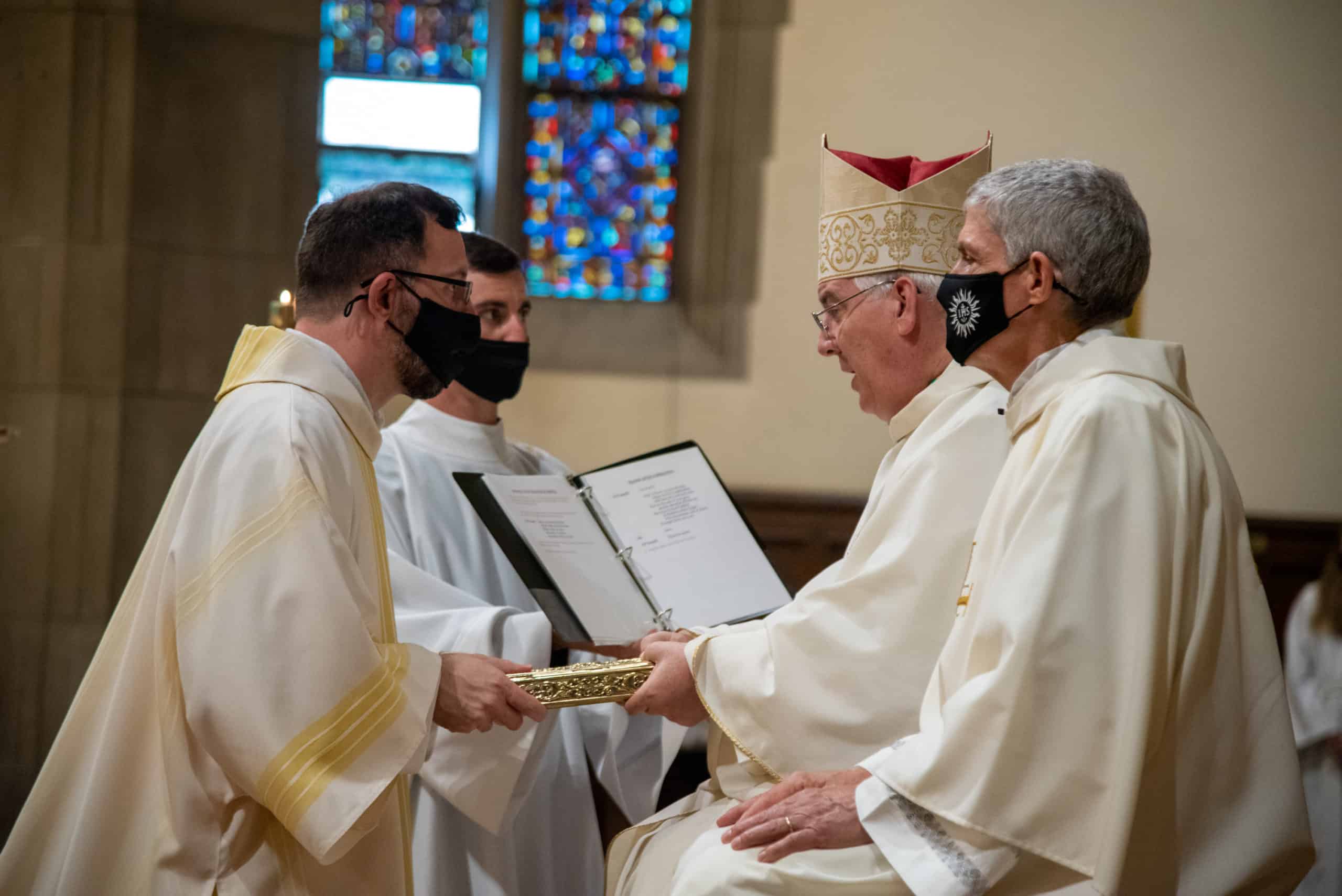This is the third installment of A Deacon’s Diary. The second installment asked what ordination feels like.
I.
I dislike preaching, I thought. I found that sometimes I just didn’t know what I wanted to say. Or I’d get nervous about delivery. Or I’d keep looking for a “hook” that would speak to the BU students at Marsh Chapel, something that I would translate the message of the gospel into their real-life terms–“inculturation,” as Jesuits like to say.
At the ordination, Bishop Mark handed each of us a gold-covered book of the Gospels as we knelt before him. He said:
Receive the Gospel of Christ, whose herald you have become.
Believe what you read, teach what you believe, and practice what you teach.
I said, Amen. And hoped it would become true.
II.
It was the first Sunday I was preaching at Boston University’s Marsh Chapel and I was unlucky. I had a notoriously difficult gospel passage: Mark 9’s infamous “if it causes you to sin, cut it off,” a passage that led to slander against the third-century theologian, Origen, and his supposed, rumored literal application of it.
I’d been praying with these readings for a week and still had nothing much to say. Nothing interesting, anyway.
I finally settled on preaching about distraction, cell phone use, and separation from God. Discussions of sin are important, I acknowledged. Separation from God, however, is something we need to pay attention to–something that arises from us and not from God (a thread I thought I found in the readings).
Cell phone use became an illustration, as I realized that I pick mine up on average 95 times per day. (Apple helpfully keeps track of this.) My proposal, then, for myself, for my congregation was to try and develop a habit of pausing for a moment to remember Jesus before picking up my devices.
III.
The following Sunday, I was preaching a student night Mass at Boston College. The priest, a brother Jesuit and friend, introduced me at the start of the liturgy and commented:
Listen to him. He has profound wisdom to share.
I sure hope so, I thought. That Sunday, I’d struggled with the readings as much as the previous Sunday. The week’s gospel was Mark 10, on divorce, perhaps not so directly applicable to congregations of students, yet still important.
I opened with a comment that another Jesuit had posted to Facebook that it was “a good day to tell a few cute stories from your past about how your family stopped at Dunkin’ Donuts after Mass every Sunday. Or it was a good day for the deacon to preach.” Priests joke about handing off difficult readings to deacons.
I drew on one of my favorite themes that runs through Augustine and Pascal: that the human person has a God-shaped emptiness inside and while we might be made for marriage, or for religious vows, and friendships, we’re certainly made for relationship with God.
IV.
Another weekend, I was preaching on both Saturday and Sunday. I was pretty anxious. I’d decided to begin preaching without any notes or text apart from the lectionary book. My first time of three preaching that weekend was in front of about forty students from BU who were on retreat.
It’d been a long week and while I’d been praying with the texts, I didn’t have time to write down the homily that had begun taking shape in my head. So—for good or for bad—I decided to outline it a few times in my head, decide what I was going to say on each point and then just go from there. Whatever that meant.
I know Jesuits who never prepare to preach and just listen to the readings at Mass as they’re being read and come up with something good to say.
That’d never be me, I thought once. And now, it almost was. I mean, I wrote the whole homily in my head two days before. Rehearsed it. But without notes … I might forget something. Or the Holy Spirit might have other ideas once I was vested and reading from the book of the Gospels.
I’d planned to do this for all three Masses I was preaching that weekend.
The first time, it seemed to go well: I was dynamic (thanks to the several cups of coffee at breakfast as well as the work of the Holy Spirit).
The second time, at an early morning Mass, before any coffee, I was preaching about lenses for reading that gospel. I focused on rivalry and desire for Christ. It was successful enough, I thought. Particularly because I’d entirely avoided mentioning René Girard. I’d been reading a lot of his work for a course lately, especially discussions of desire and rivalry. I didn’t even use the word “mimetic”–a fancy term to explain how all desire is about imitation of someone else’s desire.
The third time, the evening of the same day, I was exhausted from being on retreat with students and felt like I stuttered through the entire homily.
V.
Preaching was something I’d struggled with my whole life as a Jesuit—nearly ten years. Sometimes, it went well. But it was still a struggle. Since I was trained to teach university, sometimes it was an honest effort not to make it into a lecture before a class. I grappled to find what I wanted to say. I strained to listen to how God was speaking about the texts and the Word as I prayed.
I’d had a whole semester of a preaching practicum the year before. And had preached on and off at various points in Jesuit life: in novitiate, in community life, sometimes at student Masses where I taught. I got as much practice as I wanted. And sometimes I avoided it.
Sometimes the problem for me has been that I want people in the pews to criticize or offer feedback. Or fill out reviews on a preacher’s version of Yelp. Something, just to know how it went. What spoke. What fell flat.
Sometimes I preached with everything I had and the congregation was silent, maybe bored.
I was often looking for my voice. Or God’s voice.
Sometimes both were silent.
VI.
Another Sunday, I was traveling with a friend, a Jesuit priest. We’d made a mistake about Mass schedules—we thought there was an evening Mass on the campus and there wasn’t, it’d been cancelled.
I suggested that he might say Mass for us.
At the last minute, while setting out the chalice and wine and bread and books, I decided to vest. I put on an alb from the common closet and improvised a deacon’s diagonal stole by tying the ends of a priest’s stole. It was just the two of us for Mass in a small, but handsome Jesuit house chapel.
I admired the simple stained-glass windows, depicting the tria munera – the three aspects of Christ as priest, prophet, and king that all the baptized partake of.
As we processed and reverenced the altar, just the two of us before a congregation of the communion of saints, I wondered who would preach. I glanced around at the empty seats filling the chapel.
When the time came, I bowed and asked for the blessing before proclaiming the gospel. I had thoughts for preaching, in case it came to that.
Instead, I sat down across from my friend and we both meditated on the gospel and accompanying readings in silence.
After Mass, I said to him: I was prepared to preach. I had ideas. He said: I wondered about that.
It was better, perhaps, that we sat in silence. The example of my priest-friend in his goodness and care for God’s people illumined much for me.
The gospel contained the famous injunction from Jesus to the rich man:
Go, sell what you have, give to the poor, then come and follow me. (Mark 10: 21)
This was something as Jesuits we endeavored to do. I found that often the company of good companions, dedicated to serving God’s people, taught me much. This friend and brother was no exception.
One Sunday, he told students that I had profound wisdom. Now, we sat in silence and considered that day’s scriptures on the Book of Wisdom:
Yet all good things together came to me in her company, and countless riches at her hands. (Wis 7: 11)
In the next installment of A Deacon’s Diary, Steve is confronted with the question: how do you pray through doubt?


